Sample Entrepreneurship and Small Business Management Assignment
VerifiedAdded on 2021/02/20
|15
|4830
|14
AI Summary
Contribute Materials
Your contribution can guide someone’s learning journey. Share your
documents today.

ENTREPRENEURSHIP
AND SMALL BUSINESS
MANAGEMENT
AND SMALL BUSINESS
MANAGEMENT
Secure Best Marks with AI Grader
Need help grading? Try our AI Grader for instant feedback on your assignments.
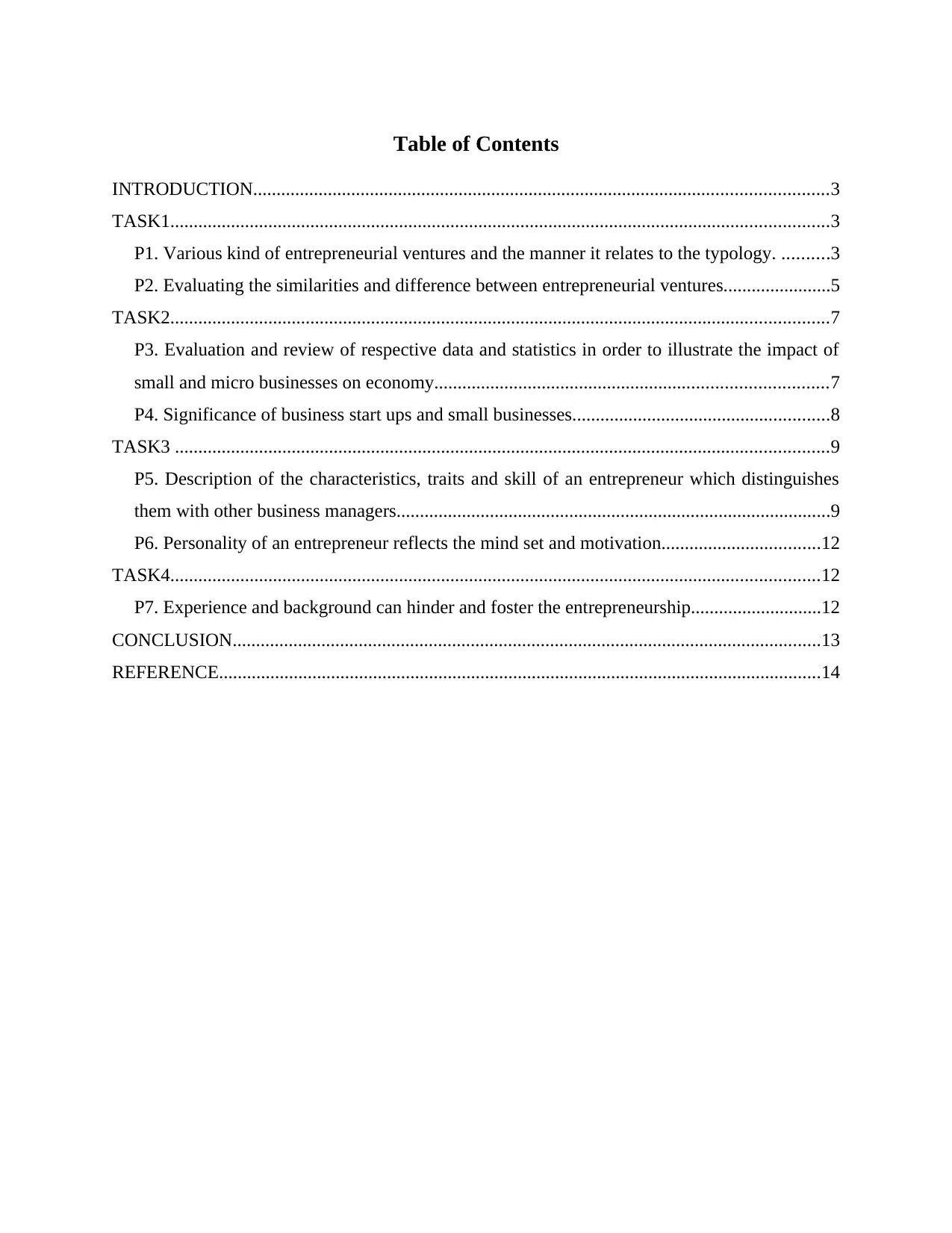
Table of Contents
INTRODUCTION...........................................................................................................................3
TASK1.............................................................................................................................................3
P1. Various kind of entrepreneurial ventures and the manner it relates to the typology. ..........3
P2. Evaluating the similarities and difference between entrepreneurial ventures.......................5
TASK2.............................................................................................................................................7
P3. Evaluation and review of respective data and statistics in order to illustrate the impact of
small and micro businesses on economy....................................................................................7
P4. Significance of business start ups and small businesses.......................................................8
TASK3 ............................................................................................................................................9
P5. Description of the characteristics, traits and skill of an entrepreneur which distinguishes
them with other business managers.............................................................................................9
P6. Personality of an entrepreneur reflects the mind set and motivation..................................12
TASK4...........................................................................................................................................12
P7. Experience and background can hinder and foster the entrepreneurship............................12
CONCLUSION..............................................................................................................................13
REFERENCE.................................................................................................................................14
INTRODUCTION...........................................................................................................................3
TASK1.............................................................................................................................................3
P1. Various kind of entrepreneurial ventures and the manner it relates to the typology. ..........3
P2. Evaluating the similarities and difference between entrepreneurial ventures.......................5
TASK2.............................................................................................................................................7
P3. Evaluation and review of respective data and statistics in order to illustrate the impact of
small and micro businesses on economy....................................................................................7
P4. Significance of business start ups and small businesses.......................................................8
TASK3 ............................................................................................................................................9
P5. Description of the characteristics, traits and skill of an entrepreneur which distinguishes
them with other business managers.............................................................................................9
P6. Personality of an entrepreneur reflects the mind set and motivation..................................12
TASK4...........................................................................................................................................12
P7. Experience and background can hinder and foster the entrepreneurship............................12
CONCLUSION..............................................................................................................................13
REFERENCE.................................................................................................................................14
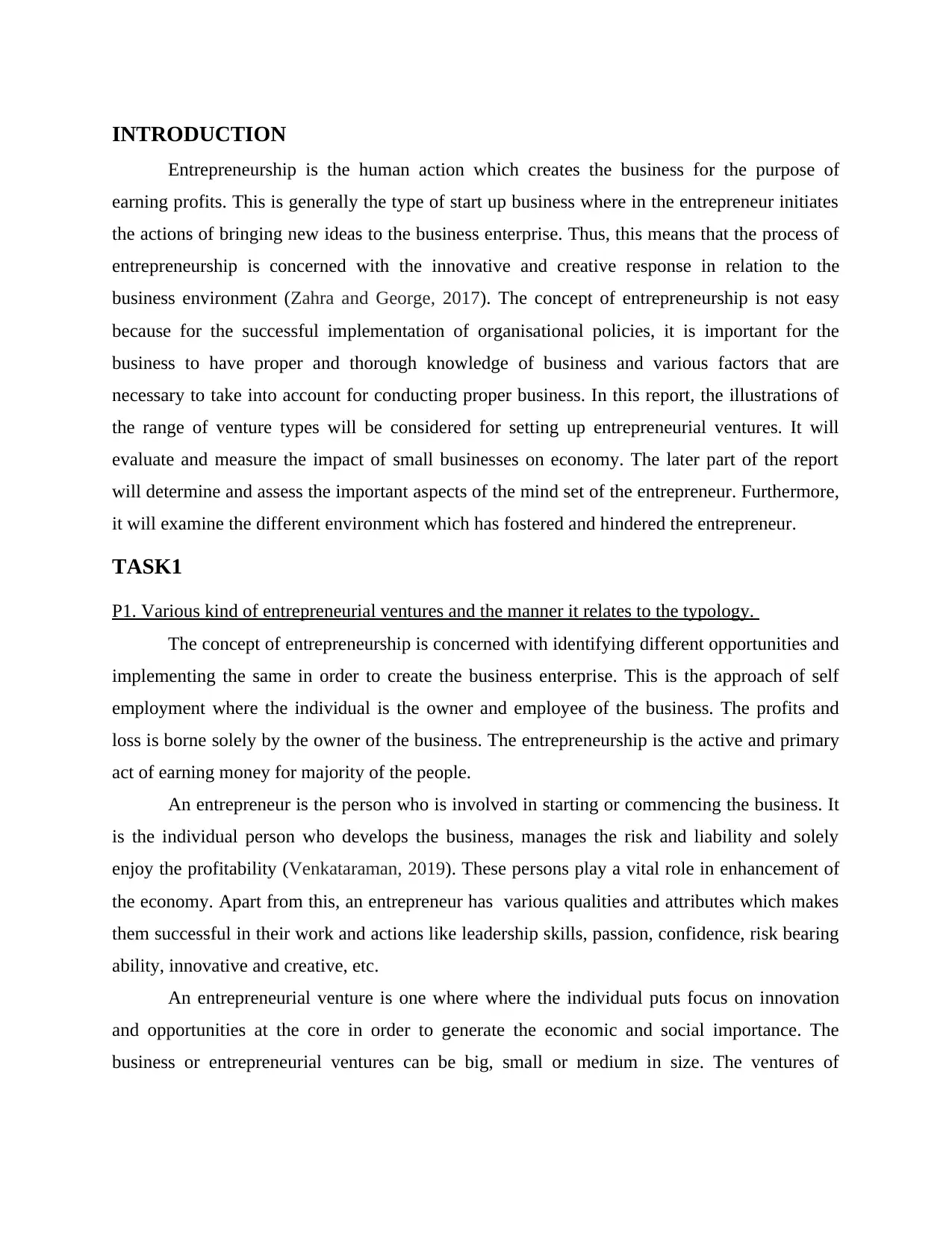
INTRODUCTION
Entrepreneurship is the human action which creates the business for the purpose of
earning profits. This is generally the type of start up business where in the entrepreneur initiates
the actions of bringing new ideas to the business enterprise. Thus, this means that the process of
entrepreneurship is concerned with the innovative and creative response in relation to the
business environment (Zahra and George, 2017). The concept of entrepreneurship is not easy
because for the successful implementation of organisational policies, it is important for the
business to have proper and thorough knowledge of business and various factors that are
necessary to take into account for conducting proper business. In this report, the illustrations of
the range of venture types will be considered for setting up entrepreneurial ventures. It will
evaluate and measure the impact of small businesses on economy. The later part of the report
will determine and assess the important aspects of the mind set of the entrepreneur. Furthermore,
it will examine the different environment which has fostered and hindered the entrepreneur.
TASK1
P1. Various kind of entrepreneurial ventures and the manner it relates to the typology.
The concept of entrepreneurship is concerned with identifying different opportunities and
implementing the same in order to create the business enterprise. This is the approach of self
employment where the individual is the owner and employee of the business. The profits and
loss is borne solely by the owner of the business. The entrepreneurship is the active and primary
act of earning money for majority of the people.
An entrepreneur is the person who is involved in starting or commencing the business. It
is the individual person who develops the business, manages the risk and liability and solely
enjoy the profitability (Venkataraman, 2019). These persons play a vital role in enhancement of
the economy. Apart from this, an entrepreneur has various qualities and attributes which makes
them successful in their work and actions like leadership skills, passion, confidence, risk bearing
ability, innovative and creative, etc.
An entrepreneurial venture is one where where the individual puts focus on innovation
and opportunities at the core in order to generate the economic and social importance. The
business or entrepreneurial ventures can be big, small or medium in size. The ventures of
Entrepreneurship is the human action which creates the business for the purpose of
earning profits. This is generally the type of start up business where in the entrepreneur initiates
the actions of bringing new ideas to the business enterprise. Thus, this means that the process of
entrepreneurship is concerned with the innovative and creative response in relation to the
business environment (Zahra and George, 2017). The concept of entrepreneurship is not easy
because for the successful implementation of organisational policies, it is important for the
business to have proper and thorough knowledge of business and various factors that are
necessary to take into account for conducting proper business. In this report, the illustrations of
the range of venture types will be considered for setting up entrepreneurial ventures. It will
evaluate and measure the impact of small businesses on economy. The later part of the report
will determine and assess the important aspects of the mind set of the entrepreneur. Furthermore,
it will examine the different environment which has fostered and hindered the entrepreneur.
TASK1
P1. Various kind of entrepreneurial ventures and the manner it relates to the typology.
The concept of entrepreneurship is concerned with identifying different opportunities and
implementing the same in order to create the business enterprise. This is the approach of self
employment where the individual is the owner and employee of the business. The profits and
loss is borne solely by the owner of the business. The entrepreneurship is the active and primary
act of earning money for majority of the people.
An entrepreneur is the person who is involved in starting or commencing the business. It
is the individual person who develops the business, manages the risk and liability and solely
enjoy the profitability (Venkataraman, 2019). These persons play a vital role in enhancement of
the economy. Apart from this, an entrepreneur has various qualities and attributes which makes
them successful in their work and actions like leadership skills, passion, confidence, risk bearing
ability, innovative and creative, etc.
An entrepreneurial venture is one where where the individual puts focus on innovation
and opportunities at the core in order to generate the economic and social importance. The
business or entrepreneurial ventures can be big, small or medium in size. The ventures of
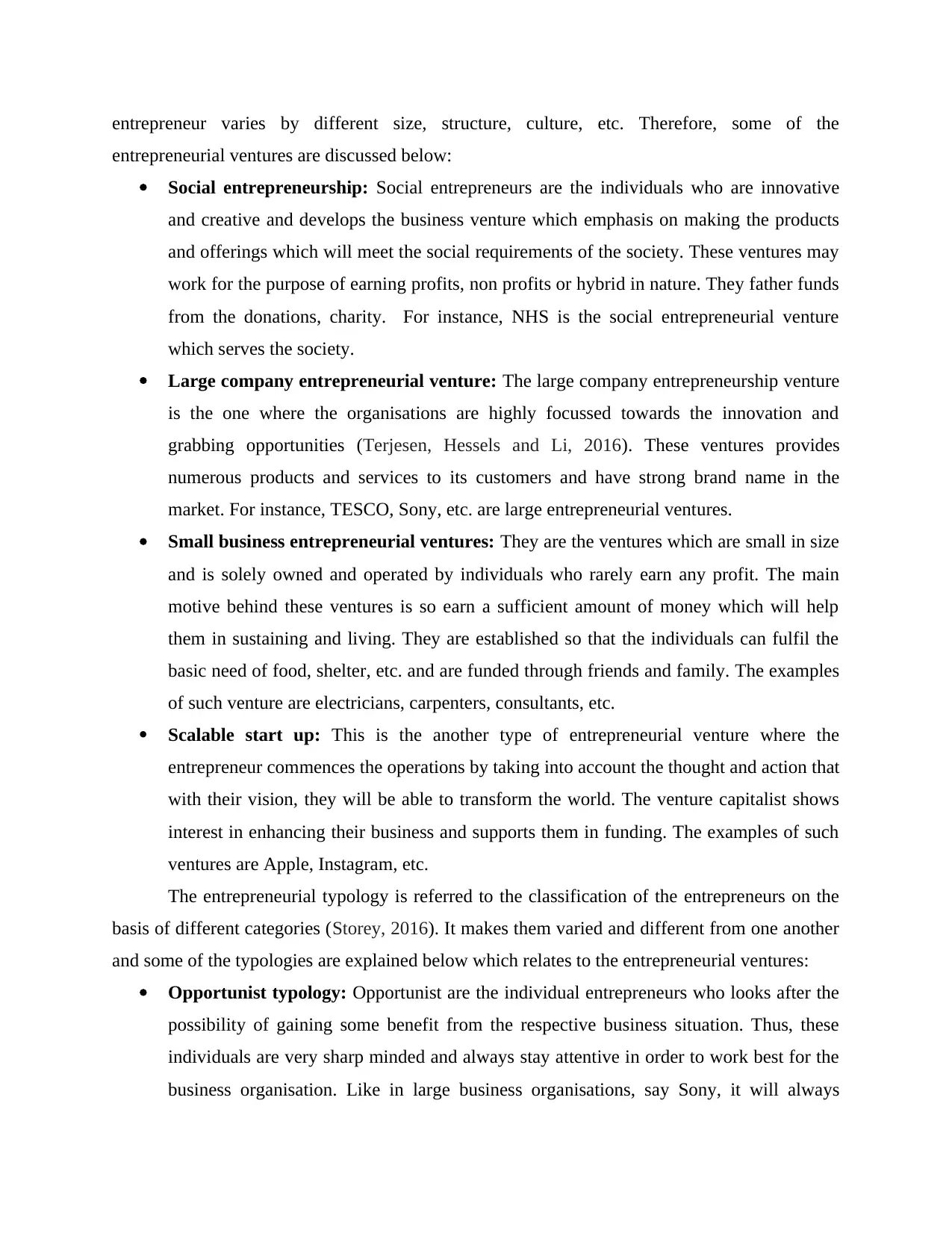
entrepreneur varies by different size, structure, culture, etc. Therefore, some of the
entrepreneurial ventures are discussed below:
Social entrepreneurship: Social entrepreneurs are the individuals who are innovative
and creative and develops the business venture which emphasis on making the products
and offerings which will meet the social requirements of the society. These ventures may
work for the purpose of earning profits, non profits or hybrid in nature. They father funds
from the donations, charity. For instance, NHS is the social entrepreneurial venture
which serves the society.
Large company entrepreneurial venture: The large company entrepreneurship venture
is the one where the organisations are highly focussed towards the innovation and
grabbing opportunities (Terjesen, Hessels and Li, 2016). These ventures provides
numerous products and services to its customers and have strong brand name in the
market. For instance, TESCO, Sony, etc. are large entrepreneurial ventures.
Small business entrepreneurial ventures: They are the ventures which are small in size
and is solely owned and operated by individuals who rarely earn any profit. The main
motive behind these ventures is so earn a sufficient amount of money which will help
them in sustaining and living. They are established so that the individuals can fulfil the
basic need of food, shelter, etc. and are funded through friends and family. The examples
of such venture are electricians, carpenters, consultants, etc.
Scalable start up: This is the another type of entrepreneurial venture where the
entrepreneur commences the operations by taking into account the thought and action that
with their vision, they will be able to transform the world. The venture capitalist shows
interest in enhancing their business and supports them in funding. The examples of such
ventures are Apple, Instagram, etc.
The entrepreneurial typology is referred to the classification of the entrepreneurs on the
basis of different categories (Storey, 2016). It makes them varied and different from one another
and some of the typologies are explained below which relates to the entrepreneurial ventures:
Opportunist typology: Opportunist are the individual entrepreneurs who looks after the
possibility of gaining some benefit from the respective business situation. Thus, these
individuals are very sharp minded and always stay attentive in order to work best for the
business organisation. Like in large business organisations, say Sony, it will always
entrepreneurial ventures are discussed below:
Social entrepreneurship: Social entrepreneurs are the individuals who are innovative
and creative and develops the business venture which emphasis on making the products
and offerings which will meet the social requirements of the society. These ventures may
work for the purpose of earning profits, non profits or hybrid in nature. They father funds
from the donations, charity. For instance, NHS is the social entrepreneurial venture
which serves the society.
Large company entrepreneurial venture: The large company entrepreneurship venture
is the one where the organisations are highly focussed towards the innovation and
grabbing opportunities (Terjesen, Hessels and Li, 2016). These ventures provides
numerous products and services to its customers and have strong brand name in the
market. For instance, TESCO, Sony, etc. are large entrepreneurial ventures.
Small business entrepreneurial ventures: They are the ventures which are small in size
and is solely owned and operated by individuals who rarely earn any profit. The main
motive behind these ventures is so earn a sufficient amount of money which will help
them in sustaining and living. They are established so that the individuals can fulfil the
basic need of food, shelter, etc. and are funded through friends and family. The examples
of such venture are electricians, carpenters, consultants, etc.
Scalable start up: This is the another type of entrepreneurial venture where the
entrepreneur commences the operations by taking into account the thought and action that
with their vision, they will be able to transform the world. The venture capitalist shows
interest in enhancing their business and supports them in funding. The examples of such
ventures are Apple, Instagram, etc.
The entrepreneurial typology is referred to the classification of the entrepreneurs on the
basis of different categories (Storey, 2016). It makes them varied and different from one another
and some of the typologies are explained below which relates to the entrepreneurial ventures:
Opportunist typology: Opportunist are the individual entrepreneurs who looks after the
possibility of gaining some benefit from the respective business situation. Thus, these
individuals are very sharp minded and always stay attentive in order to work best for the
business organisation. Like in large business organisations, say Sony, it will always
Secure Best Marks with AI Grader
Need help grading? Try our AI Grader for instant feedback on your assignments.
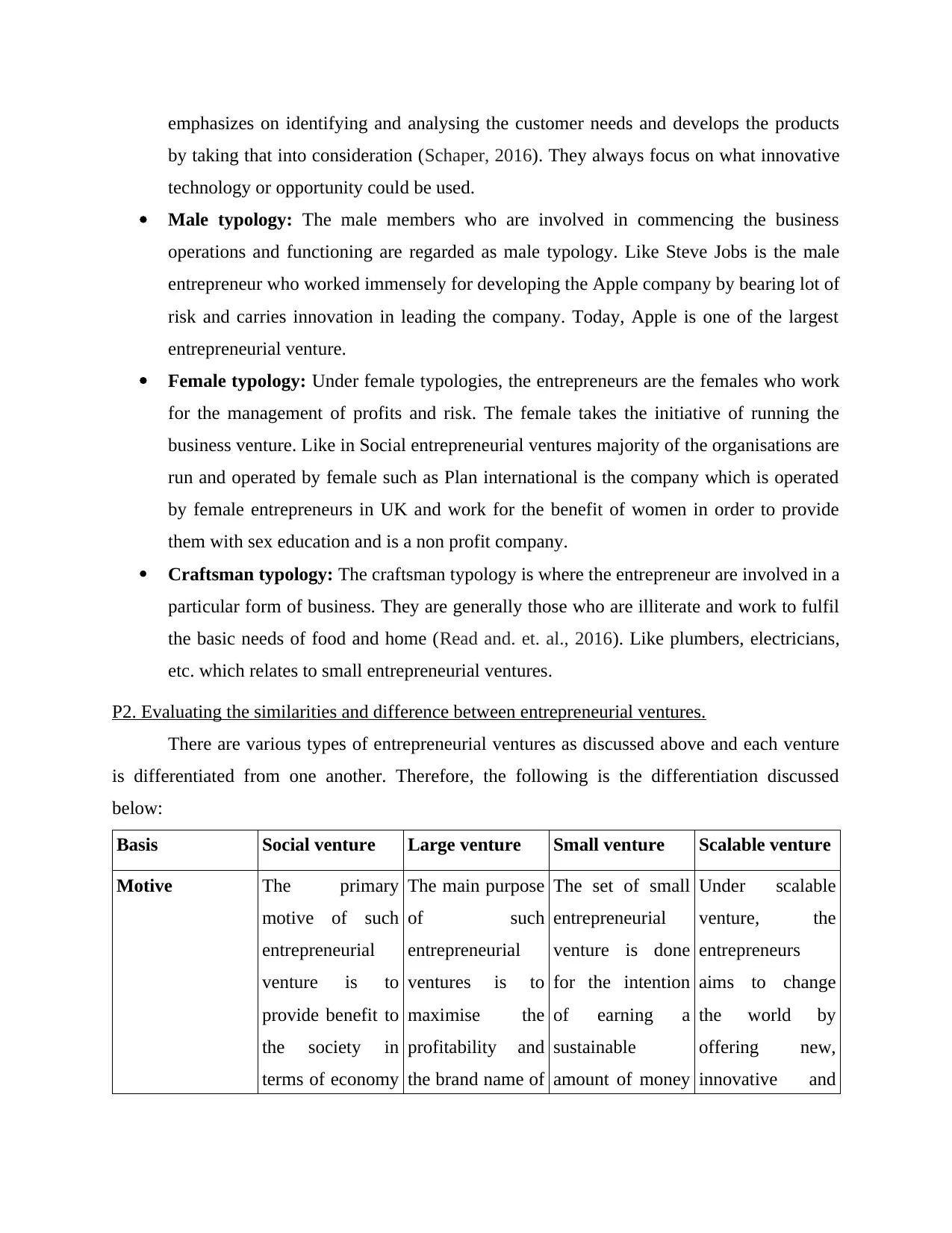
emphasizes on identifying and analysing the customer needs and develops the products
by taking that into consideration (Schaper, 2016). They always focus on what innovative
technology or opportunity could be used.
Male typology: The male members who are involved in commencing the business
operations and functioning are regarded as male typology. Like Steve Jobs is the male
entrepreneur who worked immensely for developing the Apple company by bearing lot of
risk and carries innovation in leading the company. Today, Apple is one of the largest
entrepreneurial venture.
Female typology: Under female typologies, the entrepreneurs are the females who work
for the management of profits and risk. The female takes the initiative of running the
business venture. Like in Social entrepreneurial ventures majority of the organisations are
run and operated by female such as Plan international is the company which is operated
by female entrepreneurs in UK and work for the benefit of women in order to provide
them with sex education and is a non profit company.
Craftsman typology: The craftsman typology is where the entrepreneur are involved in a
particular form of business. They are generally those who are illiterate and work to fulfil
the basic needs of food and home (Read and. et. al., 2016). Like plumbers, electricians,
etc. which relates to small entrepreneurial ventures.
P2. Evaluating the similarities and difference between entrepreneurial ventures.
There are various types of entrepreneurial ventures as discussed above and each venture
is differentiated from one another. Therefore, the following is the differentiation discussed
below:
Basis Social venture Large venture Small venture Scalable venture
Motive The primary
motive of such
entrepreneurial
venture is to
provide benefit to
the society in
terms of economy
The main purpose
of such
entrepreneurial
ventures is to
maximise the
profitability and
the brand name of
The set of small
entrepreneurial
venture is done
for the intention
of earning a
sustainable
amount of money
Under scalable
venture, the
entrepreneurs
aims to change
the world by
offering new,
innovative and
by taking that into consideration (Schaper, 2016). They always focus on what innovative
technology or opportunity could be used.
Male typology: The male members who are involved in commencing the business
operations and functioning are regarded as male typology. Like Steve Jobs is the male
entrepreneur who worked immensely for developing the Apple company by bearing lot of
risk and carries innovation in leading the company. Today, Apple is one of the largest
entrepreneurial venture.
Female typology: Under female typologies, the entrepreneurs are the females who work
for the management of profits and risk. The female takes the initiative of running the
business venture. Like in Social entrepreneurial ventures majority of the organisations are
run and operated by female such as Plan international is the company which is operated
by female entrepreneurs in UK and work for the benefit of women in order to provide
them with sex education and is a non profit company.
Craftsman typology: The craftsman typology is where the entrepreneur are involved in a
particular form of business. They are generally those who are illiterate and work to fulfil
the basic needs of food and home (Read and. et. al., 2016). Like plumbers, electricians,
etc. which relates to small entrepreneurial ventures.
P2. Evaluating the similarities and difference between entrepreneurial ventures.
There are various types of entrepreneurial ventures as discussed above and each venture
is differentiated from one another. Therefore, the following is the differentiation discussed
below:
Basis Social venture Large venture Small venture Scalable venture
Motive The primary
motive of such
entrepreneurial
venture is to
provide benefit to
the society in
terms of economy
The main purpose
of such
entrepreneurial
ventures is to
maximise the
profitability and
the brand name of
The set of small
entrepreneurial
venture is done
for the intention
of earning a
sustainable
amount of money
Under scalable
venture, the
entrepreneurs
aims to change
the world by
offering new,
innovative and
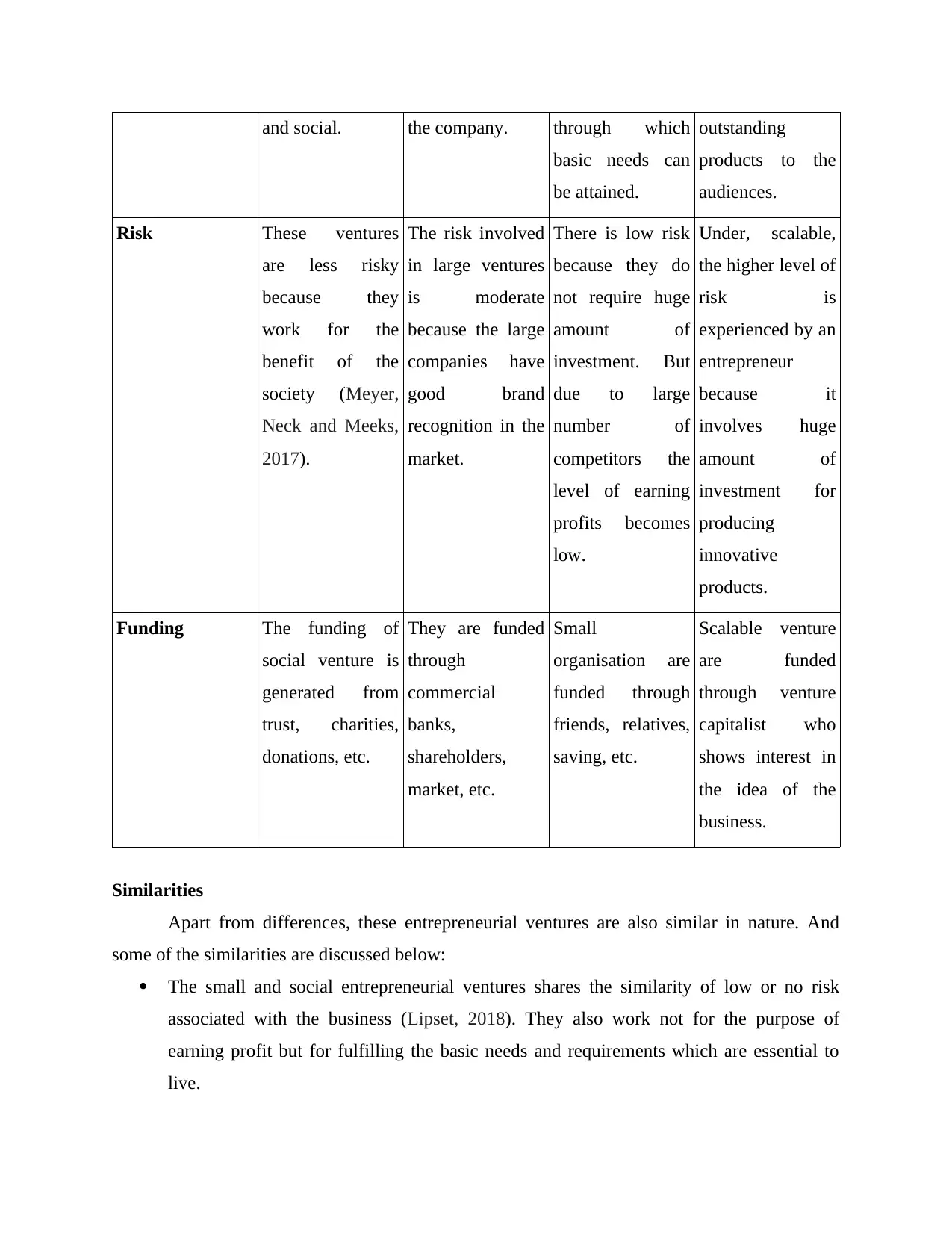
and social. the company. through which
basic needs can
be attained.
outstanding
products to the
audiences.
Risk These ventures
are less risky
because they
work for the
benefit of the
society (Meyer,
Neck and Meeks,
2017).
The risk involved
in large ventures
is moderate
because the large
companies have
good brand
recognition in the
market.
There is low risk
because they do
not require huge
amount of
investment. But
due to large
number of
competitors the
level of earning
profits becomes
low.
Under, scalable,
the higher level of
risk is
experienced by an
entrepreneur
because it
involves huge
amount of
investment for
producing
innovative
products.
Funding The funding of
social venture is
generated from
trust, charities,
donations, etc.
They are funded
through
commercial
banks,
shareholders,
market, etc.
Small
organisation are
funded through
friends, relatives,
saving, etc.
Scalable venture
are funded
through venture
capitalist who
shows interest in
the idea of the
business.
Similarities
Apart from differences, these entrepreneurial ventures are also similar in nature. And
some of the similarities are discussed below:
The small and social entrepreneurial ventures shares the similarity of low or no risk
associated with the business (Lipset, 2018). They also work not for the purpose of
earning profit but for fulfilling the basic needs and requirements which are essential to
live.
basic needs can
be attained.
outstanding
products to the
audiences.
Risk These ventures
are less risky
because they
work for the
benefit of the
society (Meyer,
Neck and Meeks,
2017).
The risk involved
in large ventures
is moderate
because the large
companies have
good brand
recognition in the
market.
There is low risk
because they do
not require huge
amount of
investment. But
due to large
number of
competitors the
level of earning
profits becomes
low.
Under, scalable,
the higher level of
risk is
experienced by an
entrepreneur
because it
involves huge
amount of
investment for
producing
innovative
products.
Funding The funding of
social venture is
generated from
trust, charities,
donations, etc.
They are funded
through
commercial
banks,
shareholders,
market, etc.
Small
organisation are
funded through
friends, relatives,
saving, etc.
Scalable venture
are funded
through venture
capitalist who
shows interest in
the idea of the
business.
Similarities
Apart from differences, these entrepreneurial ventures are also similar in nature. And
some of the similarities are discussed below:
The small and social entrepreneurial ventures shares the similarity of low or no risk
associated with the business (Lipset, 2018). They also work not for the purpose of
earning profit but for fulfilling the basic needs and requirements which are essential to
live.
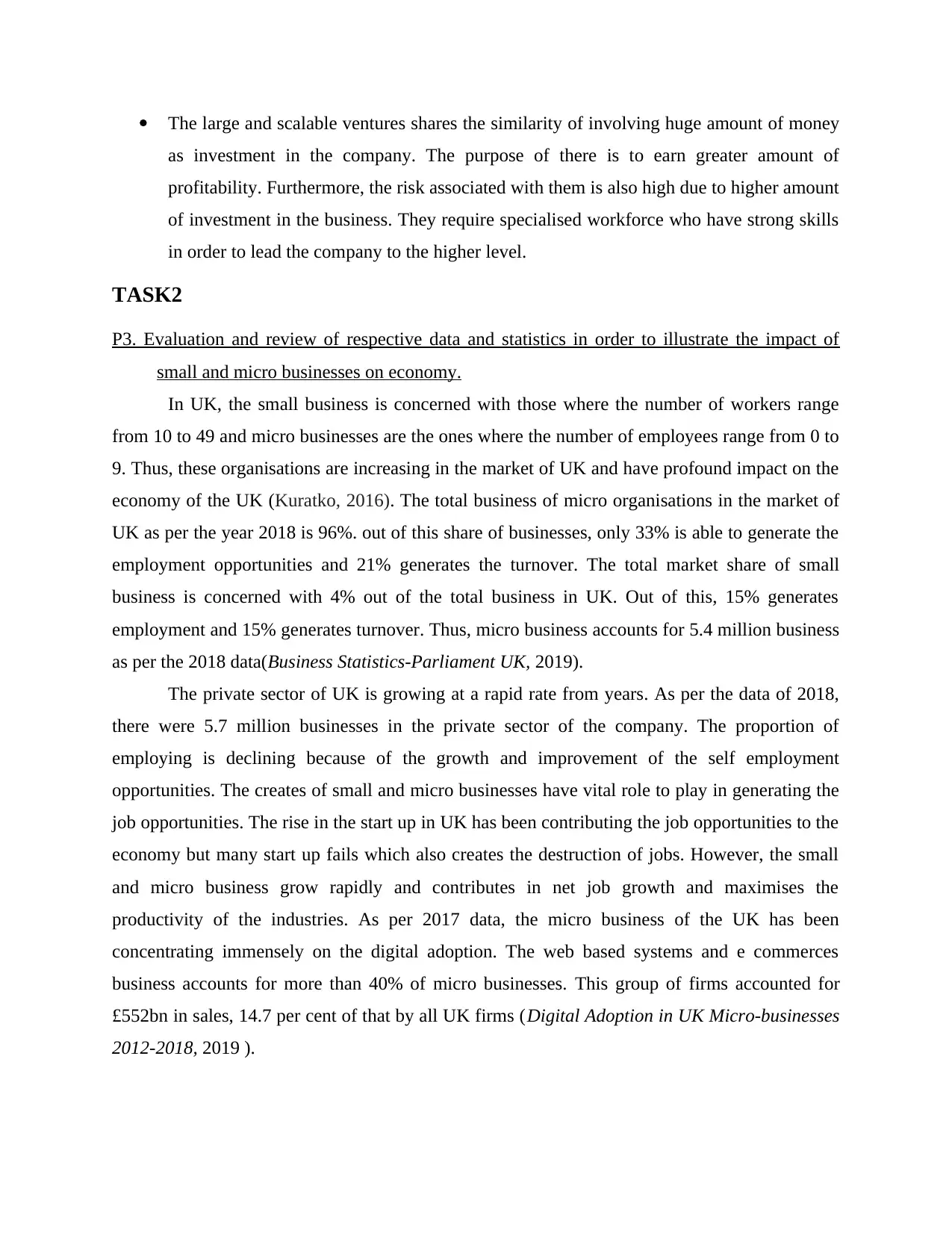
The large and scalable ventures shares the similarity of involving huge amount of money
as investment in the company. The purpose of there is to earn greater amount of
profitability. Furthermore, the risk associated with them is also high due to higher amount
of investment in the business. They require specialised workforce who have strong skills
in order to lead the company to the higher level.
TASK2
P3. Evaluation and review of respective data and statistics in order to illustrate the impact of
small and micro businesses on economy.
In UK, the small business is concerned with those where the number of workers range
from 10 to 49 and micro businesses are the ones where the number of employees range from 0 to
9. Thus, these organisations are increasing in the market of UK and have profound impact on the
economy of the UK (Kuratko, 2016). The total business of micro organisations in the market of
UK as per the year 2018 is 96%. out of this share of businesses, only 33% is able to generate the
employment opportunities and 21% generates the turnover. The total market share of small
business is concerned with 4% out of the total business in UK. Out of this, 15% generates
employment and 15% generates turnover. Thus, micro business accounts for 5.4 million business
as per the 2018 data(Business Statistics-Parliament UK, 2019).
The private sector of UK is growing at a rapid rate from years. As per the data of 2018,
there were 5.7 million businesses in the private sector of the company. The proportion of
employing is declining because of the growth and improvement of the self employment
opportunities. The creates of small and micro businesses have vital role to play in generating the
job opportunities. The rise in the start up in UK has been contributing the job opportunities to the
economy but many start up fails which also creates the destruction of jobs. However, the small
and micro business grow rapidly and contributes in net job growth and maximises the
productivity of the industries. As per 2017 data, the micro business of the UK has been
concentrating immensely on the digital adoption. The web based systems and e commerces
business accounts for more than 40% of micro businesses. This group of firms accounted for
£552bn in sales, 14.7 per cent of that by all UK firms (Digital Adoption in UK Micro-businesses
2012-2018, 2019 ).
as investment in the company. The purpose of there is to earn greater amount of
profitability. Furthermore, the risk associated with them is also high due to higher amount
of investment in the business. They require specialised workforce who have strong skills
in order to lead the company to the higher level.
TASK2
P3. Evaluation and review of respective data and statistics in order to illustrate the impact of
small and micro businesses on economy.
In UK, the small business is concerned with those where the number of workers range
from 10 to 49 and micro businesses are the ones where the number of employees range from 0 to
9. Thus, these organisations are increasing in the market of UK and have profound impact on the
economy of the UK (Kuratko, 2016). The total business of micro organisations in the market of
UK as per the year 2018 is 96%. out of this share of businesses, only 33% is able to generate the
employment opportunities and 21% generates the turnover. The total market share of small
business is concerned with 4% out of the total business in UK. Out of this, 15% generates
employment and 15% generates turnover. Thus, micro business accounts for 5.4 million business
as per the 2018 data(Business Statistics-Parliament UK, 2019).
The private sector of UK is growing at a rapid rate from years. As per the data of 2018,
there were 5.7 million businesses in the private sector of the company. The proportion of
employing is declining because of the growth and improvement of the self employment
opportunities. The creates of small and micro businesses have vital role to play in generating the
job opportunities. The rise in the start up in UK has been contributing the job opportunities to the
economy but many start up fails which also creates the destruction of jobs. However, the small
and micro business grow rapidly and contributes in net job growth and maximises the
productivity of the industries. As per 2017 data, the micro business of the UK has been
concentrating immensely on the digital adoption. The web based systems and e commerces
business accounts for more than 40% of micro businesses. This group of firms accounted for
£552bn in sales, 14.7 per cent of that by all UK firms (Digital Adoption in UK Micro-businesses
2012-2018, 2019 ).
Paraphrase This Document
Need a fresh take? Get an instant paraphrase of this document with our AI Paraphraser
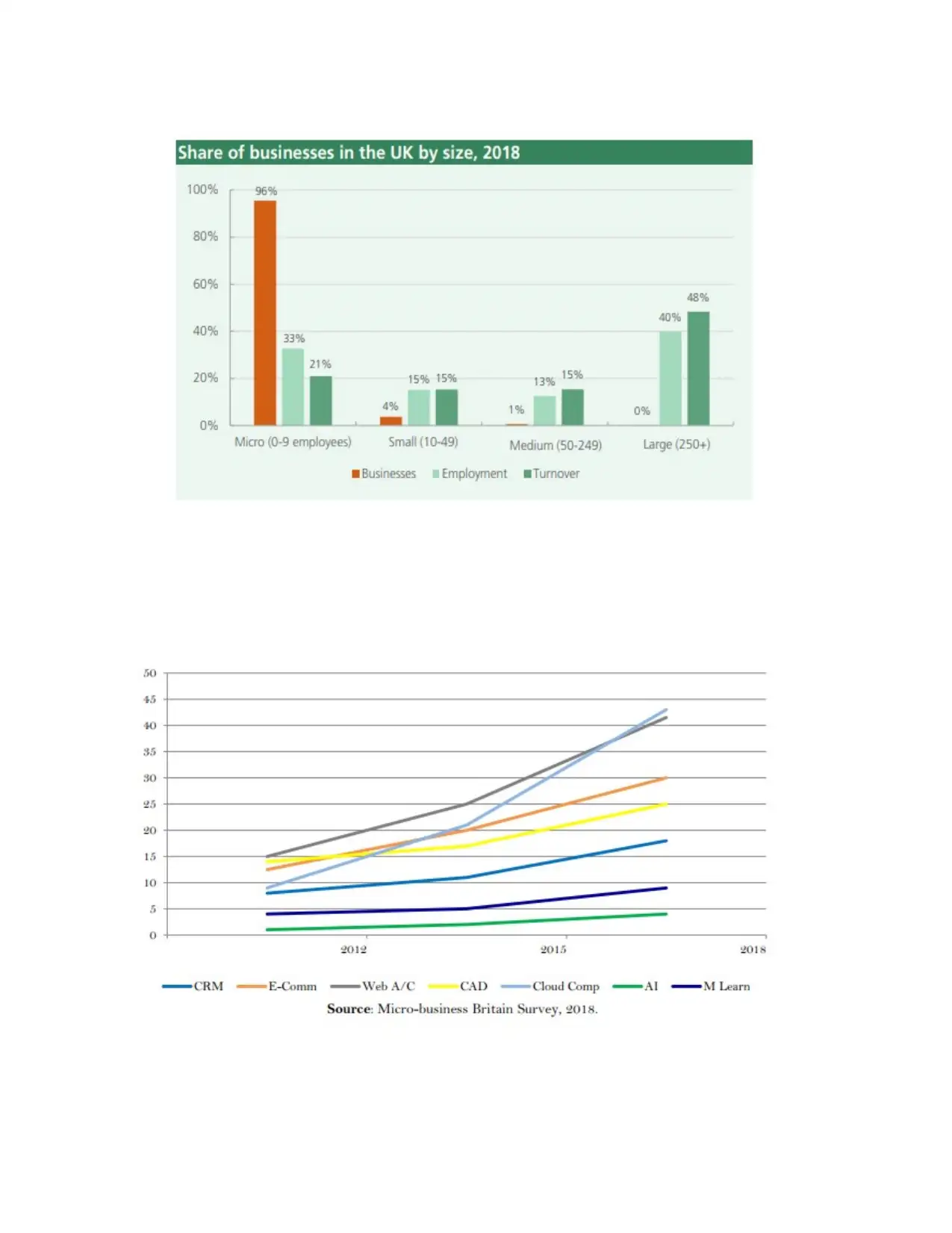
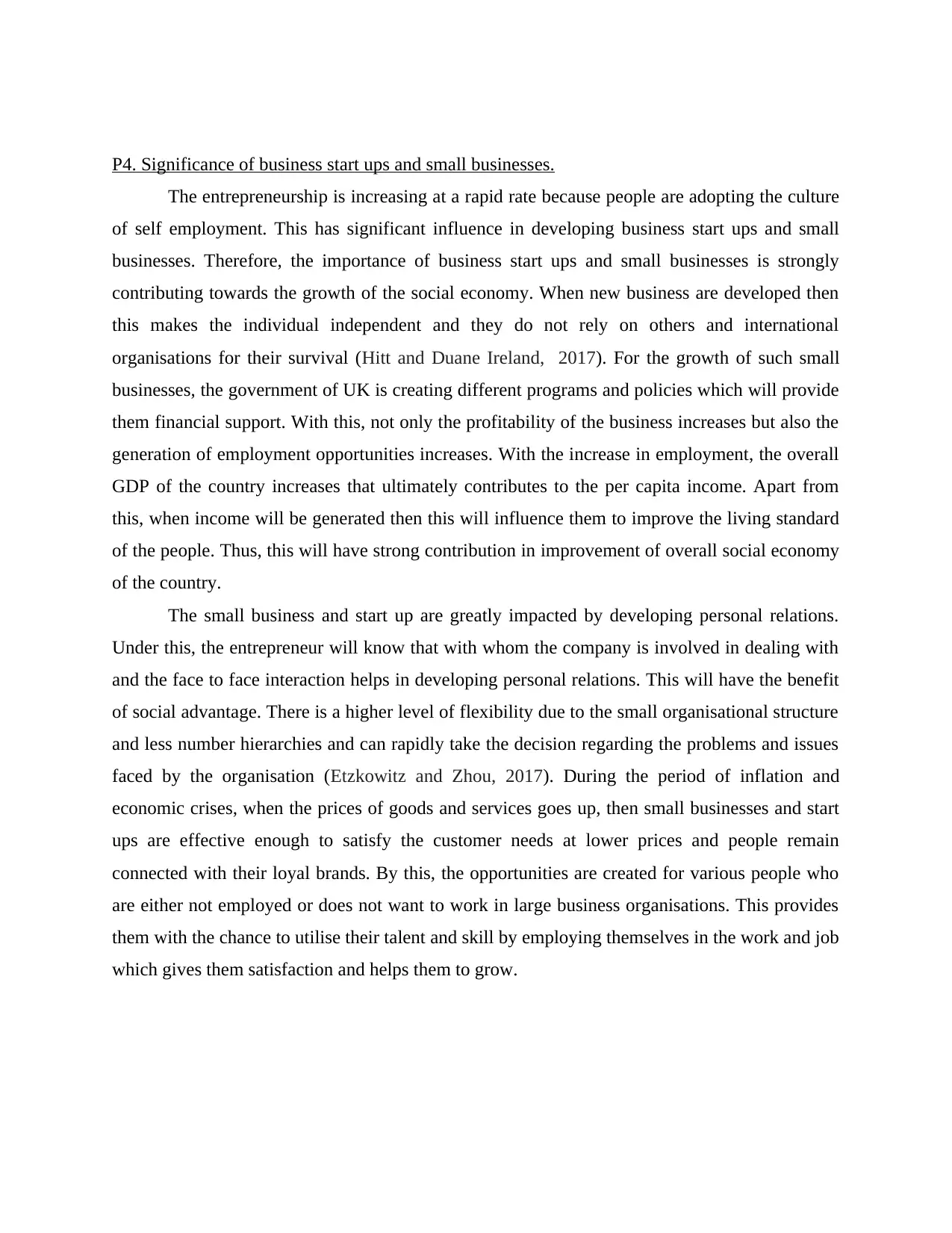
P4. Significance of business start ups and small businesses.
The entrepreneurship is increasing at a rapid rate because people are adopting the culture
of self employment. This has significant influence in developing business start ups and small
businesses. Therefore, the importance of business start ups and small businesses is strongly
contributing towards the growth of the social economy. When new business are developed then
this makes the individual independent and they do not rely on others and international
organisations for their survival (Hitt and Duane Ireland, 2017). For the growth of such small
businesses, the government of UK is creating different programs and policies which will provide
them financial support. With this, not only the profitability of the business increases but also the
generation of employment opportunities increases. With the increase in employment, the overall
GDP of the country increases that ultimately contributes to the per capita income. Apart from
this, when income will be generated then this will influence them to improve the living standard
of the people. Thus, this will have strong contribution in improvement of overall social economy
of the country.
The small business and start up are greatly impacted by developing personal relations.
Under this, the entrepreneur will know that with whom the company is involved in dealing with
and the face to face interaction helps in developing personal relations. This will have the benefit
of social advantage. There is a higher level of flexibility due to the small organisational structure
and less number hierarchies and can rapidly take the decision regarding the problems and issues
faced by the organisation (Etzkowitz and Zhou, 2017). During the period of inflation and
economic crises, when the prices of goods and services goes up, then small businesses and start
ups are effective enough to satisfy the customer needs at lower prices and people remain
connected with their loyal brands. By this, the opportunities are created for various people who
are either not employed or does not want to work in large business organisations. This provides
them with the chance to utilise their talent and skill by employing themselves in the work and job
which gives them satisfaction and helps them to grow.
The entrepreneurship is increasing at a rapid rate because people are adopting the culture
of self employment. This has significant influence in developing business start ups and small
businesses. Therefore, the importance of business start ups and small businesses is strongly
contributing towards the growth of the social economy. When new business are developed then
this makes the individual independent and they do not rely on others and international
organisations for their survival (Hitt and Duane Ireland, 2017). For the growth of such small
businesses, the government of UK is creating different programs and policies which will provide
them financial support. With this, not only the profitability of the business increases but also the
generation of employment opportunities increases. With the increase in employment, the overall
GDP of the country increases that ultimately contributes to the per capita income. Apart from
this, when income will be generated then this will influence them to improve the living standard
of the people. Thus, this will have strong contribution in improvement of overall social economy
of the country.
The small business and start up are greatly impacted by developing personal relations.
Under this, the entrepreneur will know that with whom the company is involved in dealing with
and the face to face interaction helps in developing personal relations. This will have the benefit
of social advantage. There is a higher level of flexibility due to the small organisational structure
and less number hierarchies and can rapidly take the decision regarding the problems and issues
faced by the organisation (Etzkowitz and Zhou, 2017). During the period of inflation and
economic crises, when the prices of goods and services goes up, then small businesses and start
ups are effective enough to satisfy the customer needs at lower prices and people remain
connected with their loyal brands. By this, the opportunities are created for various people who
are either not employed or does not want to work in large business organisations. This provides
them with the chance to utilise their talent and skill by employing themselves in the work and job
which gives them satisfaction and helps them to grow.
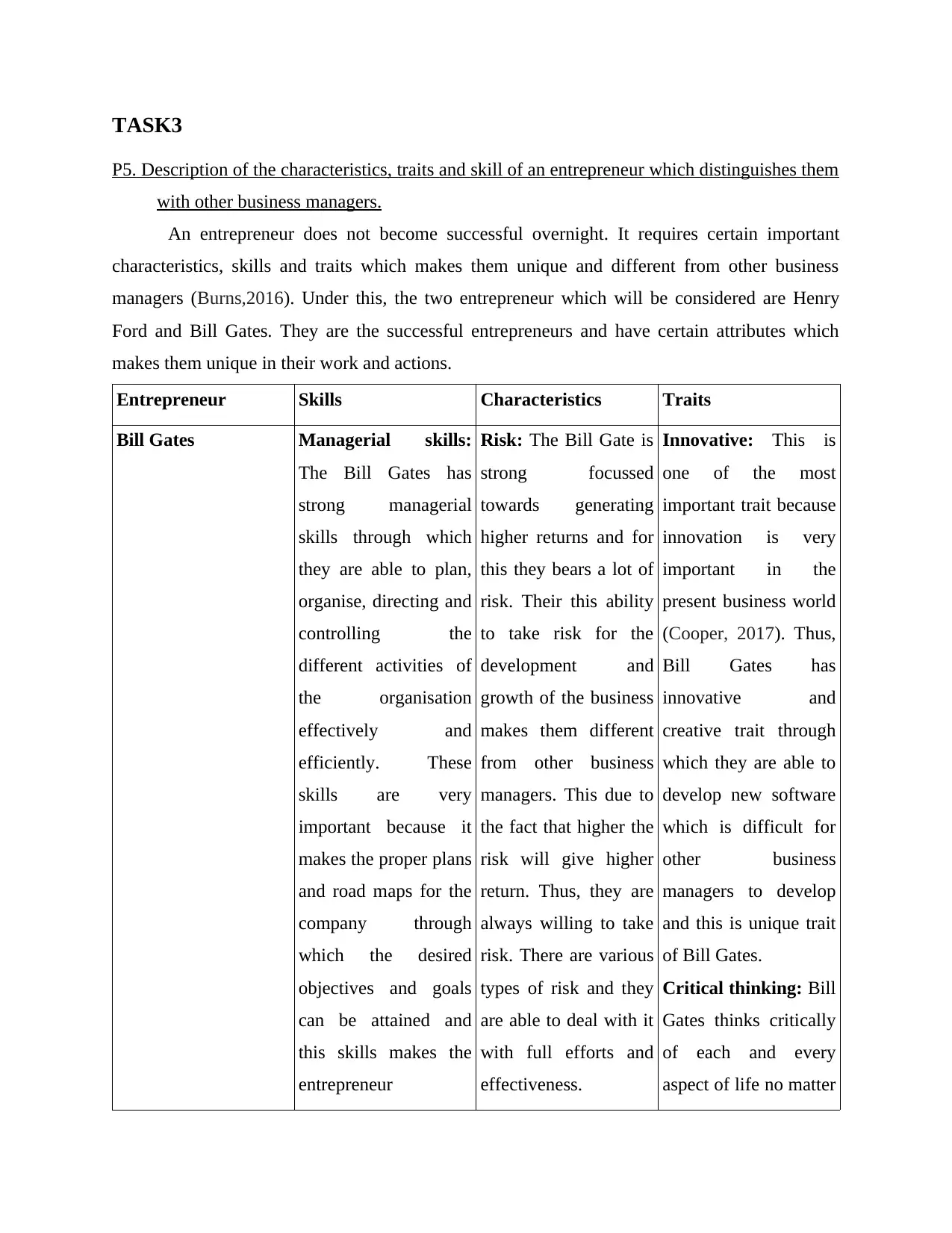
TASK3
P5. Description of the characteristics, traits and skill of an entrepreneur which distinguishes them
with other business managers.
An entrepreneur does not become successful overnight. It requires certain important
characteristics, skills and traits which makes them unique and different from other business
managers (Burns,2016). Under this, the two entrepreneur which will be considered are Henry
Ford and Bill Gates. They are the successful entrepreneurs and have certain attributes which
makes them unique in their work and actions.
Entrepreneur Skills Characteristics Traits
Bill Gates Managerial skills:
The Bill Gates has
strong managerial
skills through which
they are able to plan,
organise, directing and
controlling the
different activities of
the organisation
effectively and
efficiently. These
skills are very
important because it
makes the proper plans
and road maps for the
company through
which the desired
objectives and goals
can be attained and
this skills makes the
entrepreneur
Risk: The Bill Gate is
strong focussed
towards generating
higher returns and for
this they bears a lot of
risk. Their this ability
to take risk for the
development and
growth of the business
makes them different
from other business
managers. This due to
the fact that higher the
risk will give higher
return. Thus, they are
always willing to take
risk. There are various
types of risk and they
are able to deal with it
with full efforts and
effectiveness.
Innovative: This is
one of the most
important trait because
innovation is very
important in the
present business world
(Cooper, 2017). Thus,
Bill Gates has
innovative and
creative trait through
which they are able to
develop new software
which is difficult for
other business
managers to develop
and this is unique trait
of Bill Gates.
Critical thinking: Bill
Gates thinks critically
of each and every
aspect of life no matter
P5. Description of the characteristics, traits and skill of an entrepreneur which distinguishes them
with other business managers.
An entrepreneur does not become successful overnight. It requires certain important
characteristics, skills and traits which makes them unique and different from other business
managers (Burns,2016). Under this, the two entrepreneur which will be considered are Henry
Ford and Bill Gates. They are the successful entrepreneurs and have certain attributes which
makes them unique in their work and actions.
Entrepreneur Skills Characteristics Traits
Bill Gates Managerial skills:
The Bill Gates has
strong managerial
skills through which
they are able to plan,
organise, directing and
controlling the
different activities of
the organisation
effectively and
efficiently. These
skills are very
important because it
makes the proper plans
and road maps for the
company through
which the desired
objectives and goals
can be attained and
this skills makes the
entrepreneur
Risk: The Bill Gate is
strong focussed
towards generating
higher returns and for
this they bears a lot of
risk. Their this ability
to take risk for the
development and
growth of the business
makes them different
from other business
managers. This due to
the fact that higher the
risk will give higher
return. Thus, they are
always willing to take
risk. There are various
types of risk and they
are able to deal with it
with full efforts and
effectiveness.
Innovative: This is
one of the most
important trait because
innovation is very
important in the
present business world
(Cooper, 2017). Thus,
Bill Gates has
innovative and
creative trait through
which they are able to
develop new software
which is difficult for
other business
managers to develop
and this is unique trait
of Bill Gates.
Critical thinking: Bill
Gates thinks critically
of each and every
aspect of life no matter
Secure Best Marks with AI Grader
Need help grading? Try our AI Grader for instant feedback on your assignments.
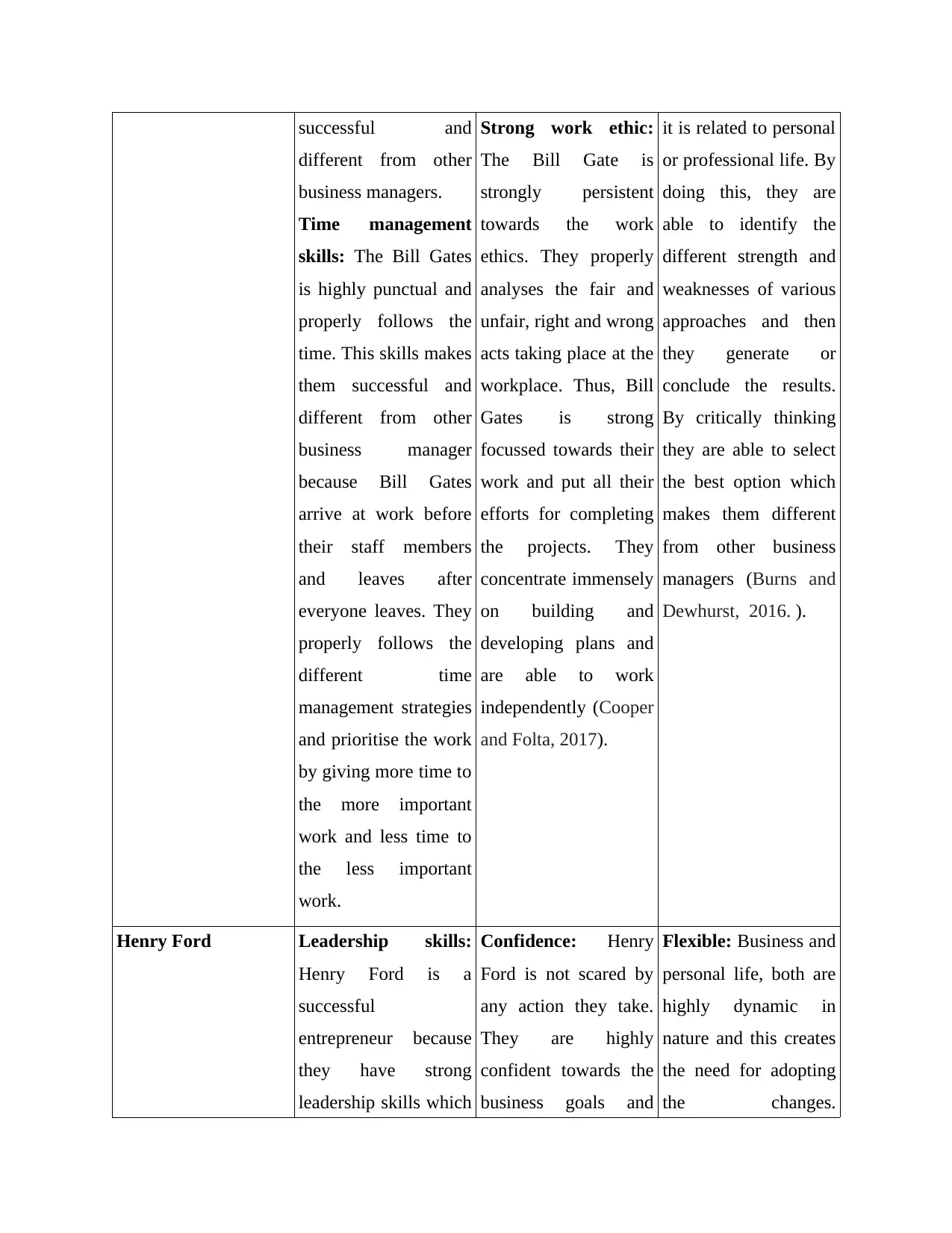
successful and
different from other
business managers.
Time management
skills: The Bill Gates
is highly punctual and
properly follows the
time. This skills makes
them successful and
different from other
business manager
because Bill Gates
arrive at work before
their staff members
and leaves after
everyone leaves. They
properly follows the
different time
management strategies
and prioritise the work
by giving more time to
the more important
work and less time to
the less important
work.
Strong work ethic:
The Bill Gate is
strongly persistent
towards the work
ethics. They properly
analyses the fair and
unfair, right and wrong
acts taking place at the
workplace. Thus, Bill
Gates is strong
focussed towards their
work and put all their
efforts for completing
the projects. They
concentrate immensely
on building and
developing plans and
are able to work
independently (Cooper
and Folta, 2017).
it is related to personal
or professional life. By
doing this, they are
able to identify the
different strength and
weaknesses of various
approaches and then
they generate or
conclude the results.
By critically thinking
they are able to select
the best option which
makes them different
from other business
managers (Burns and
Dewhurst, 2016. ).
Henry Ford Leadership skills:
Henry Ford is a
successful
entrepreneur because
they have strong
leadership skills which
Confidence: Henry
Ford is not scared by
any action they take.
They are highly
confident towards the
business goals and
Flexible: Business and
personal life, both are
highly dynamic in
nature and this creates
the need for adopting
the changes.
different from other
business managers.
Time management
skills: The Bill Gates
is highly punctual and
properly follows the
time. This skills makes
them successful and
different from other
business manager
because Bill Gates
arrive at work before
their staff members
and leaves after
everyone leaves. They
properly follows the
different time
management strategies
and prioritise the work
by giving more time to
the more important
work and less time to
the less important
work.
Strong work ethic:
The Bill Gate is
strongly persistent
towards the work
ethics. They properly
analyses the fair and
unfair, right and wrong
acts taking place at the
workplace. Thus, Bill
Gates is strong
focussed towards their
work and put all their
efforts for completing
the projects. They
concentrate immensely
on building and
developing plans and
are able to work
independently (Cooper
and Folta, 2017).
it is related to personal
or professional life. By
doing this, they are
able to identify the
different strength and
weaknesses of various
approaches and then
they generate or
conclude the results.
By critically thinking
they are able to select
the best option which
makes them different
from other business
managers (Burns and
Dewhurst, 2016. ).
Henry Ford Leadership skills:
Henry Ford is a
successful
entrepreneur because
they have strong
leadership skills which
Confidence: Henry
Ford is not scared by
any action they take.
They are highly
confident towards the
business goals and
Flexible: Business and
personal life, both are
highly dynamic in
nature and this creates
the need for adopting
the changes.
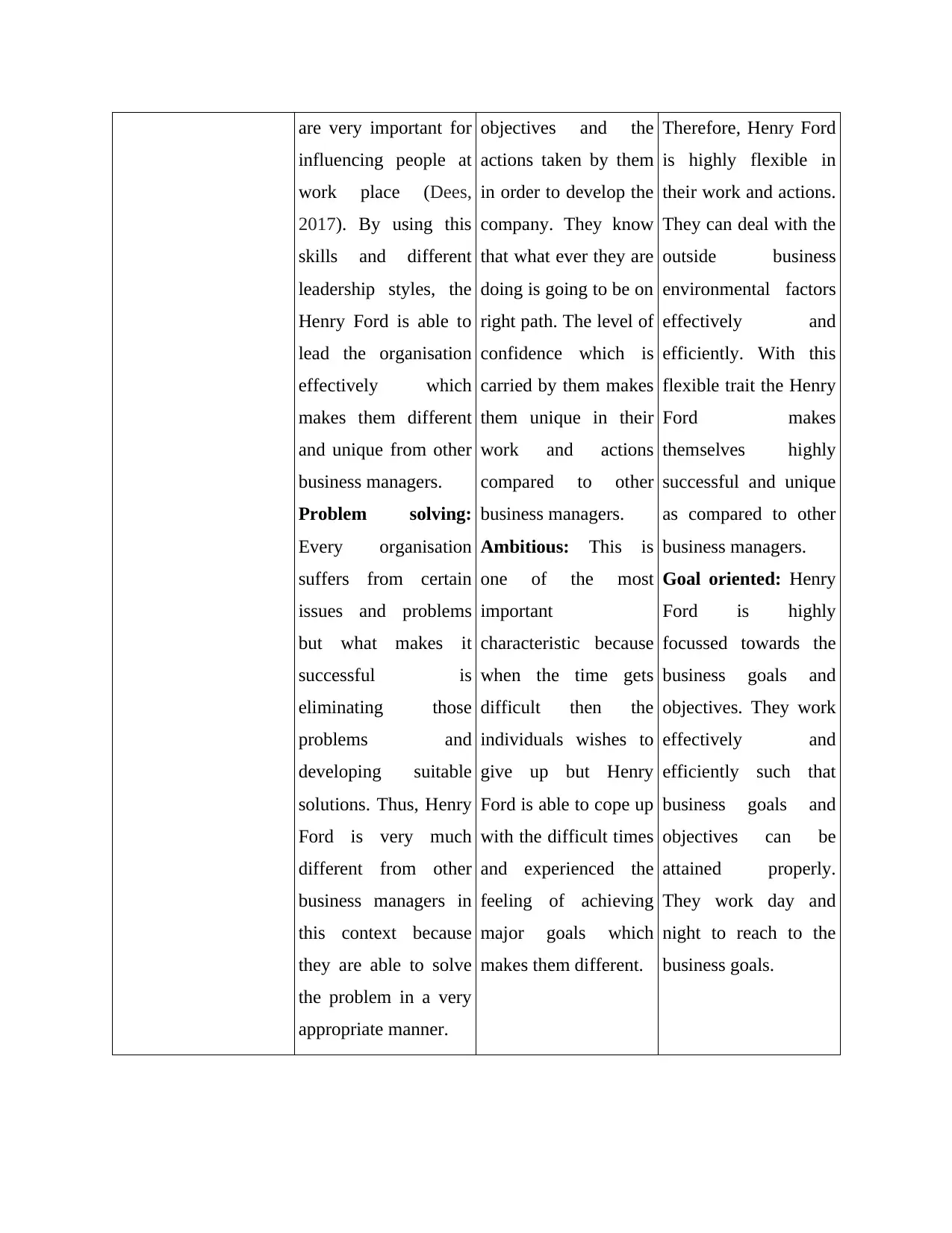
are very important for
influencing people at
work place (Dees,
2017). By using this
skills and different
leadership styles, the
Henry Ford is able to
lead the organisation
effectively which
makes them different
and unique from other
business managers.
Problem solving:
Every organisation
suffers from certain
issues and problems
but what makes it
successful is
eliminating those
problems and
developing suitable
solutions. Thus, Henry
Ford is very much
different from other
business managers in
this context because
they are able to solve
the problem in a very
appropriate manner.
objectives and the
actions taken by them
in order to develop the
company. They know
that what ever they are
doing is going to be on
right path. The level of
confidence which is
carried by them makes
them unique in their
work and actions
compared to other
business managers.
Ambitious: This is
one of the most
important
characteristic because
when the time gets
difficult then the
individuals wishes to
give up but Henry
Ford is able to cope up
with the difficult times
and experienced the
feeling of achieving
major goals which
makes them different.
Therefore, Henry Ford
is highly flexible in
their work and actions.
They can deal with the
outside business
environmental factors
effectively and
efficiently. With this
flexible trait the Henry
Ford makes
themselves highly
successful and unique
as compared to other
business managers.
Goal oriented: Henry
Ford is highly
focussed towards the
business goals and
objectives. They work
effectively and
efficiently such that
business goals and
objectives can be
attained properly.
They work day and
night to reach to the
business goals.
influencing people at
work place (Dees,
2017). By using this
skills and different
leadership styles, the
Henry Ford is able to
lead the organisation
effectively which
makes them different
and unique from other
business managers.
Problem solving:
Every organisation
suffers from certain
issues and problems
but what makes it
successful is
eliminating those
problems and
developing suitable
solutions. Thus, Henry
Ford is very much
different from other
business managers in
this context because
they are able to solve
the problem in a very
appropriate manner.
objectives and the
actions taken by them
in order to develop the
company. They know
that what ever they are
doing is going to be on
right path. The level of
confidence which is
carried by them makes
them unique in their
work and actions
compared to other
business managers.
Ambitious: This is
one of the most
important
characteristic because
when the time gets
difficult then the
individuals wishes to
give up but Henry
Ford is able to cope up
with the difficult times
and experienced the
feeling of achieving
major goals which
makes them different.
Therefore, Henry Ford
is highly flexible in
their work and actions.
They can deal with the
outside business
environmental factors
effectively and
efficiently. With this
flexible trait the Henry
Ford makes
themselves highly
successful and unique
as compared to other
business managers.
Goal oriented: Henry
Ford is highly
focussed towards the
business goals and
objectives. They work
effectively and
efficiently such that
business goals and
objectives can be
attained properly.
They work day and
night to reach to the
business goals.
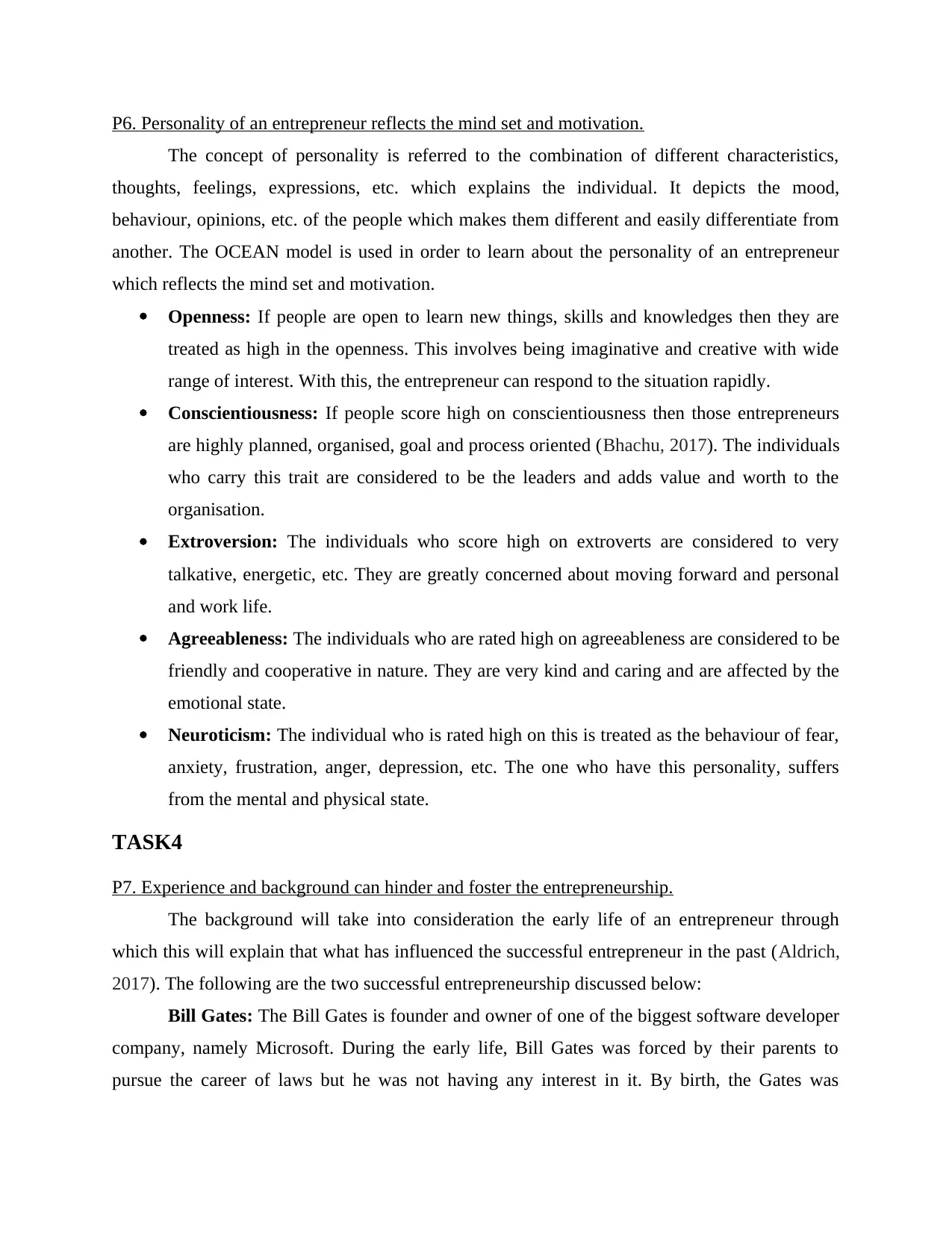
P6. Personality of an entrepreneur reflects the mind set and motivation.
The concept of personality is referred to the combination of different characteristics,
thoughts, feelings, expressions, etc. which explains the individual. It depicts the mood,
behaviour, opinions, etc. of the people which makes them different and easily differentiate from
another. The OCEAN model is used in order to learn about the personality of an entrepreneur
which reflects the mind set and motivation.
Openness: If people are open to learn new things, skills and knowledges then they are
treated as high in the openness. This involves being imaginative and creative with wide
range of interest. With this, the entrepreneur can respond to the situation rapidly.
Conscientiousness: If people score high on conscientiousness then those entrepreneurs
are highly planned, organised, goal and process oriented (Bhachu, 2017). The individuals
who carry this trait are considered to be the leaders and adds value and worth to the
organisation.
Extroversion: The individuals who score high on extroverts are considered to very
talkative, energetic, etc. They are greatly concerned about moving forward and personal
and work life.
Agreeableness: The individuals who are rated high on agreeableness are considered to be
friendly and cooperative in nature. They are very kind and caring and are affected by the
emotional state.
Neuroticism: The individual who is rated high on this is treated as the behaviour of fear,
anxiety, frustration, anger, depression, etc. The one who have this personality, suffers
from the mental and physical state.
TASK4
P7. Experience and background can hinder and foster the entrepreneurship.
The background will take into consideration the early life of an entrepreneur through
which this will explain that what has influenced the successful entrepreneur in the past (Aldrich,
2017). The following are the two successful entrepreneurship discussed below:
Bill Gates: The Bill Gates is founder and owner of one of the biggest software developer
company, namely Microsoft. During the early life, Bill Gates was forced by their parents to
pursue the career of laws but he was not having any interest in it. By birth, the Gates was
The concept of personality is referred to the combination of different characteristics,
thoughts, feelings, expressions, etc. which explains the individual. It depicts the mood,
behaviour, opinions, etc. of the people which makes them different and easily differentiate from
another. The OCEAN model is used in order to learn about the personality of an entrepreneur
which reflects the mind set and motivation.
Openness: If people are open to learn new things, skills and knowledges then they are
treated as high in the openness. This involves being imaginative and creative with wide
range of interest. With this, the entrepreneur can respond to the situation rapidly.
Conscientiousness: If people score high on conscientiousness then those entrepreneurs
are highly planned, organised, goal and process oriented (Bhachu, 2017). The individuals
who carry this trait are considered to be the leaders and adds value and worth to the
organisation.
Extroversion: The individuals who score high on extroverts are considered to very
talkative, energetic, etc. They are greatly concerned about moving forward and personal
and work life.
Agreeableness: The individuals who are rated high on agreeableness are considered to be
friendly and cooperative in nature. They are very kind and caring and are affected by the
emotional state.
Neuroticism: The individual who is rated high on this is treated as the behaviour of fear,
anxiety, frustration, anger, depression, etc. The one who have this personality, suffers
from the mental and physical state.
TASK4
P7. Experience and background can hinder and foster the entrepreneurship.
The background will take into consideration the early life of an entrepreneur through
which this will explain that what has influenced the successful entrepreneur in the past (Aldrich,
2017). The following are the two successful entrepreneurship discussed below:
Bill Gates: The Bill Gates is founder and owner of one of the biggest software developer
company, namely Microsoft. During the early life, Bill Gates was forced by their parents to
pursue the career of laws but he was not having any interest in it. By birth, the Gates was
Paraphrase This Document
Need a fresh take? Get an instant paraphrase of this document with our AI Paraphraser
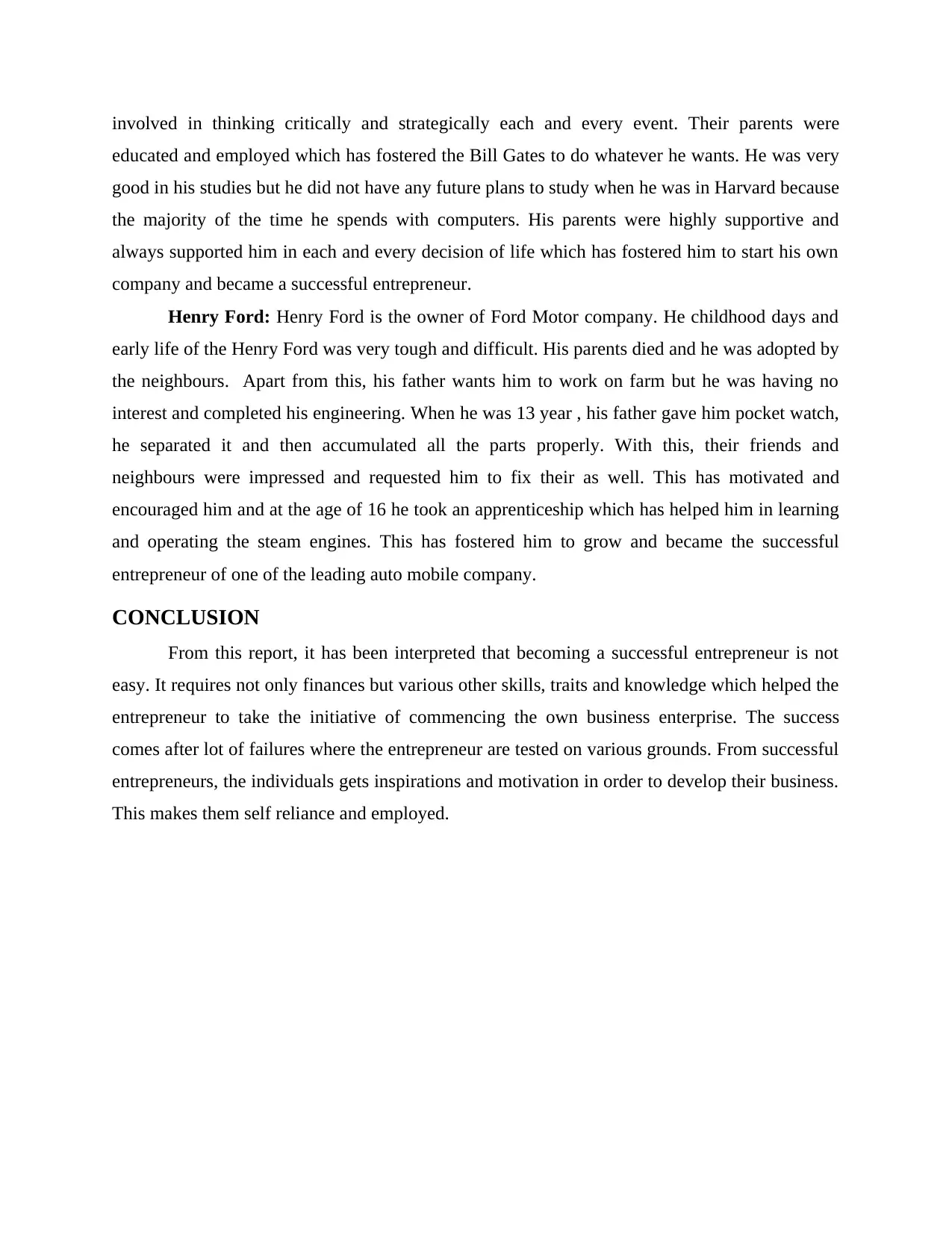
involved in thinking critically and strategically each and every event. Their parents were
educated and employed which has fostered the Bill Gates to do whatever he wants. He was very
good in his studies but he did not have any future plans to study when he was in Harvard because
the majority of the time he spends with computers. His parents were highly supportive and
always supported him in each and every decision of life which has fostered him to start his own
company and became a successful entrepreneur.
Henry Ford: Henry Ford is the owner of Ford Motor company. He childhood days and
early life of the Henry Ford was very tough and difficult. His parents died and he was adopted by
the neighbours. Apart from this, his father wants him to work on farm but he was having no
interest and completed his engineering. When he was 13 year , his father gave him pocket watch,
he separated it and then accumulated all the parts properly. With this, their friends and
neighbours were impressed and requested him to fix their as well. This has motivated and
encouraged him and at the age of 16 he took an apprenticeship which has helped him in learning
and operating the steam engines. This has fostered him to grow and became the successful
entrepreneur of one of the leading auto mobile company.
CONCLUSION
From this report, it has been interpreted that becoming a successful entrepreneur is not
easy. It requires not only finances but various other skills, traits and knowledge which helped the
entrepreneur to take the initiative of commencing the own business enterprise. The success
comes after lot of failures where the entrepreneur are tested on various grounds. From successful
entrepreneurs, the individuals gets inspirations and motivation in order to develop their business.
This makes them self reliance and employed.
educated and employed which has fostered the Bill Gates to do whatever he wants. He was very
good in his studies but he did not have any future plans to study when he was in Harvard because
the majority of the time he spends with computers. His parents were highly supportive and
always supported him in each and every decision of life which has fostered him to start his own
company and became a successful entrepreneur.
Henry Ford: Henry Ford is the owner of Ford Motor company. He childhood days and
early life of the Henry Ford was very tough and difficult. His parents died and he was adopted by
the neighbours. Apart from this, his father wants him to work on farm but he was having no
interest and completed his engineering. When he was 13 year , his father gave him pocket watch,
he separated it and then accumulated all the parts properly. With this, their friends and
neighbours were impressed and requested him to fix their as well. This has motivated and
encouraged him and at the age of 16 he took an apprenticeship which has helped him in learning
and operating the steam engines. This has fostered him to grow and became the successful
entrepreneur of one of the leading auto mobile company.
CONCLUSION
From this report, it has been interpreted that becoming a successful entrepreneur is not
easy. It requires not only finances but various other skills, traits and knowledge which helped the
entrepreneur to take the initiative of commencing the own business enterprise. The success
comes after lot of failures where the entrepreneur are tested on various grounds. From successful
entrepreneurs, the individuals gets inspirations and motivation in order to develop their business.
This makes them self reliance and employed.
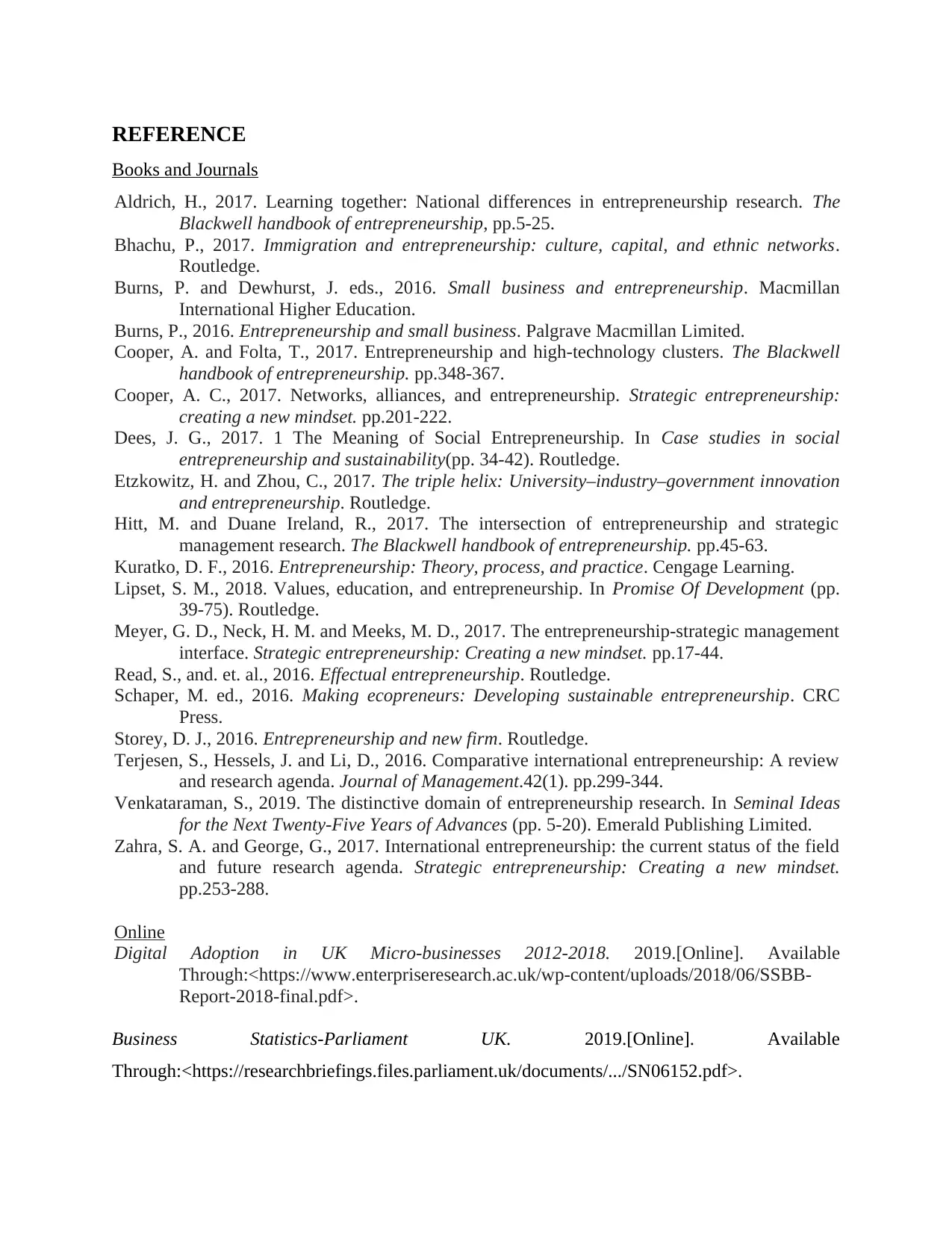
REFERENCE
Books and Journals
Aldrich, H., 2017. Learning together: National differences in entrepreneurship research. The
Blackwell handbook of entrepreneurship, pp.5-25.
Bhachu, P., 2017. Immigration and entrepreneurship: culture, capital, and ethnic networks.
Routledge.
Burns, P. and Dewhurst, J. eds., 2016. Small business and entrepreneurship. Macmillan
International Higher Education.
Burns, P., 2016. Entrepreneurship and small business. Palgrave Macmillan Limited.
Cooper, A. and Folta, T., 2017. Entrepreneurship and high‐technology clusters. The Blackwell
handbook of entrepreneurship. pp.348-367.
Cooper, A. C., 2017. Networks, alliances, and entrepreneurship. Strategic entrepreneurship:
creating a new mindset. pp.201-222.
Dees, J. G., 2017. 1 The Meaning of Social Entrepreneurship. In Case studies in social
entrepreneurship and sustainability(pp. 34-42). Routledge.
Etzkowitz, H. and Zhou, C., 2017. The triple helix: University–industry–government innovation
and entrepreneurship. Routledge.
Hitt, M. and Duane Ireland, R., 2017. The intersection of entrepreneurship and strategic
management research. The Blackwell handbook of entrepreneurship. pp.45-63.
Kuratko, D. F., 2016. Entrepreneurship: Theory, process, and practice. Cengage Learning.
Lipset, S. M., 2018. Values, education, and entrepreneurship. In Promise Of Development (pp.
39-75). Routledge.
Meyer, G. D., Neck, H. M. and Meeks, M. D., 2017. The entrepreneurship‐strategic management
interface. Strategic entrepreneurship: Creating a new mindset. pp.17-44.
Read, S., and. et. al., 2016. Effectual entrepreneurship. Routledge.
Schaper, M. ed., 2016. Making ecopreneurs: Developing sustainable entrepreneurship. CRC
Press.
Storey, D. J., 2016. Entrepreneurship and new firm. Routledge.
Terjesen, S., Hessels, J. and Li, D., 2016. Comparative international entrepreneurship: A review
and research agenda. Journal of Management.42(1). pp.299-344.
Venkataraman, S., 2019. The distinctive domain of entrepreneurship research. In Seminal Ideas
for the Next Twenty-Five Years of Advances (pp. 5-20). Emerald Publishing Limited.
Zahra, S. A. and George, G., 2017. International entrepreneurship: the current status of the field
and future research agenda. Strategic entrepreneurship: Creating a new mindset.
pp.253-288.
Online
Digital Adoption in UK Micro-businesses 2012-2018. 2019.[Online]. Available
Through:<https://www.enterpriseresearch.ac.uk/wp-content/uploads/2018/06/SSBB-
Report-2018-final.pdf>.
Business Statistics-Parliament UK. 2019.[Online]. Available
Through:<https://researchbriefings.files.parliament.uk/documents/.../SN06152.pdf>.
Books and Journals
Aldrich, H., 2017. Learning together: National differences in entrepreneurship research. The
Blackwell handbook of entrepreneurship, pp.5-25.
Bhachu, P., 2017. Immigration and entrepreneurship: culture, capital, and ethnic networks.
Routledge.
Burns, P. and Dewhurst, J. eds., 2016. Small business and entrepreneurship. Macmillan
International Higher Education.
Burns, P., 2016. Entrepreneurship and small business. Palgrave Macmillan Limited.
Cooper, A. and Folta, T., 2017. Entrepreneurship and high‐technology clusters. The Blackwell
handbook of entrepreneurship. pp.348-367.
Cooper, A. C., 2017. Networks, alliances, and entrepreneurship. Strategic entrepreneurship:
creating a new mindset. pp.201-222.
Dees, J. G., 2017. 1 The Meaning of Social Entrepreneurship. In Case studies in social
entrepreneurship and sustainability(pp. 34-42). Routledge.
Etzkowitz, H. and Zhou, C., 2017. The triple helix: University–industry–government innovation
and entrepreneurship. Routledge.
Hitt, M. and Duane Ireland, R., 2017. The intersection of entrepreneurship and strategic
management research. The Blackwell handbook of entrepreneurship. pp.45-63.
Kuratko, D. F., 2016. Entrepreneurship: Theory, process, and practice. Cengage Learning.
Lipset, S. M., 2018. Values, education, and entrepreneurship. In Promise Of Development (pp.
39-75). Routledge.
Meyer, G. D., Neck, H. M. and Meeks, M. D., 2017. The entrepreneurship‐strategic management
interface. Strategic entrepreneurship: Creating a new mindset. pp.17-44.
Read, S., and. et. al., 2016. Effectual entrepreneurship. Routledge.
Schaper, M. ed., 2016. Making ecopreneurs: Developing sustainable entrepreneurship. CRC
Press.
Storey, D. J., 2016. Entrepreneurship and new firm. Routledge.
Terjesen, S., Hessels, J. and Li, D., 2016. Comparative international entrepreneurship: A review
and research agenda. Journal of Management.42(1). pp.299-344.
Venkataraman, S., 2019. The distinctive domain of entrepreneurship research. In Seminal Ideas
for the Next Twenty-Five Years of Advances (pp. 5-20). Emerald Publishing Limited.
Zahra, S. A. and George, G., 2017. International entrepreneurship: the current status of the field
and future research agenda. Strategic entrepreneurship: Creating a new mindset.
pp.253-288.
Online
Digital Adoption in UK Micro-businesses 2012-2018. 2019.[Online]. Available
Through:<https://www.enterpriseresearch.ac.uk/wp-content/uploads/2018/06/SSBB-
Report-2018-final.pdf>.
Business Statistics-Parliament UK. 2019.[Online]. Available
Through:<https://researchbriefings.files.parliament.uk/documents/.../SN06152.pdf>.
1 out of 15
Related Documents
Your All-in-One AI-Powered Toolkit for Academic Success.
+13062052269
info@desklib.com
Available 24*7 on WhatsApp / Email
![[object Object]](/_next/static/media/star-bottom.7253800d.svg)
Unlock your academic potential
© 2024 | Zucol Services PVT LTD | All rights reserved.





